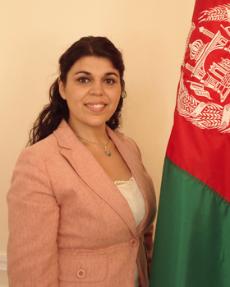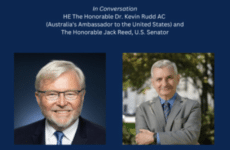By: Caroline McKay
Posted In: News

Photo credit: SALVEToday
Awista Ayub
Some of the best days of my life involved lacing up my Adidas cleats, pulling my long black and gold socks over my shin guards, grabbing my water bottle and jogging out onto the freshly cut grass at my high school soccer field with my teammates. The sport taught respect, organization and fostered growth in both maturity and camaraderie. What I learned and loved about soccer is similarly found in the hearts of young and courageous Afghan women.
Awista Ayub, the founder of the Afghan Youth Sports Exchange, spoke about using soccer as a tool for social change and female empowerment in Afghanistan on Wednesday, February 27th in the Bazarsky Lecture Hall. The goal of her lecture was to show how women are striving to make a difference in solving human crisis. “We are humbled to have Awista start off this series of lectures,” said Dr. P. H. Liotta, Executive Director of the Pell Center. Liotta opened the lecture, “Courage to Speak,” by expressing his concerns for what Americans don’t see, such as the scars left from Taliban oppression and bloody civil wars. He explained that Ayub would be able to show another side of Afghan women that American’s knew nothing of. Media has portrayed Afghan women as victims and Ayub explained that their culture is changing and perhaps the media is to blame. Ayub grew up in Connecticut after her parents emigrated from Afghanistan during the war. Her parents said they would return back home after the war was over, but like many other Afghan immigrants, they stayed. She yearned to learn more about her country and the culture that her parents knew so well. Ayub wanted to make an impact on young girls and boys but wasn’t quite sure how to do so until she was older. Ayub’s passion and ambition followed her through college and she had a successful job working as a chemist for General Electric. However, one day Ayub realized that it was not what she wanted and had a desire to move forward. Her father, proud of her accomplishments, but a bit shocked after she left GE, knew that she was going to make a change. “If I had the passion to do it, why can’t I do it for Afghan women?” asked Ayub. She did. After spending countless hours on the internet researching and writing grant proposals, her plans started to take flight. She had flown in summer recruits in 2004 based on their leadership potential in the hopes that they would return home as empowered Afghan women. Ayub’s first love was tennis and then hockey. Though she never kicked the ball around in school, she knew it didn’t take much equipment to play soccer. “All you need is a ball and some open space,” said Ayub. The recruits learned the game quickly and returned home to play with their friends. The 30 years of war and depression crushed any dream of playing a sport. Since females had been threatened by the 5-year reign of the Taliban, it was hard to transform from being silent, scared and uneducated to feeling vivacious, free and happy. Integrating soccer into the lives of the young girls wasn’t an easy task. A short documentary shown at the lecture was produced by ESPN in 2006. It showed a soccer field surrounded by tall, concrete walls topped with winding barbed wire. Only when guarded by the military, with rifles in hand, were the young athletes allowed to run, kick and feel liberated. Some members of the Salve Regina University’s soccer team attended the lecture and left with teary eyes. One student even told Ayub after the lecture that what she did was absolutely remarkable and extremely touching. Both the young Afghan athletes and Ayub are pioneers breaking down gender walls and building freedom and happiness one brick at a time. Ayub has seen the evolution of what a sport can do for a community and is confident that sports can fight racism and bring other awareness like the AIDS epidemic in Africa. “Sports are a universal language, a common ground,” said Ayub. Though not all of Afghanistan has welcomed young women as athletes, Ayub knows these girls are going to be great leaders and potentially soccer coaches in the future. Like the young Afghan girls, Ayub too is a brave leader that has been a catalyst for change. Liotta said it best. “She is an extraordinary human being.” To learn more about Ayub and the sports exchange program, Google “sports for social change.”













